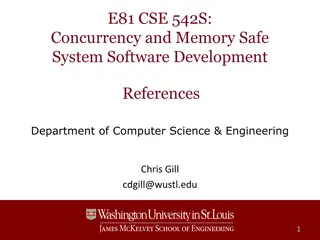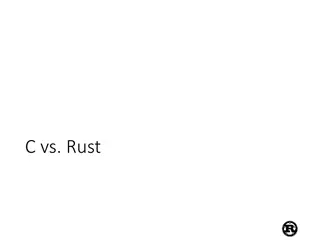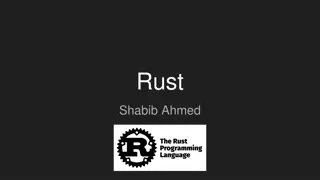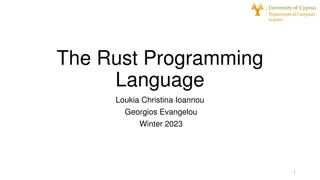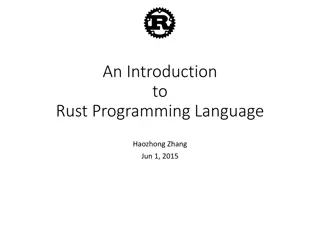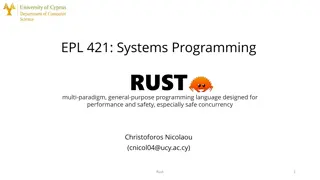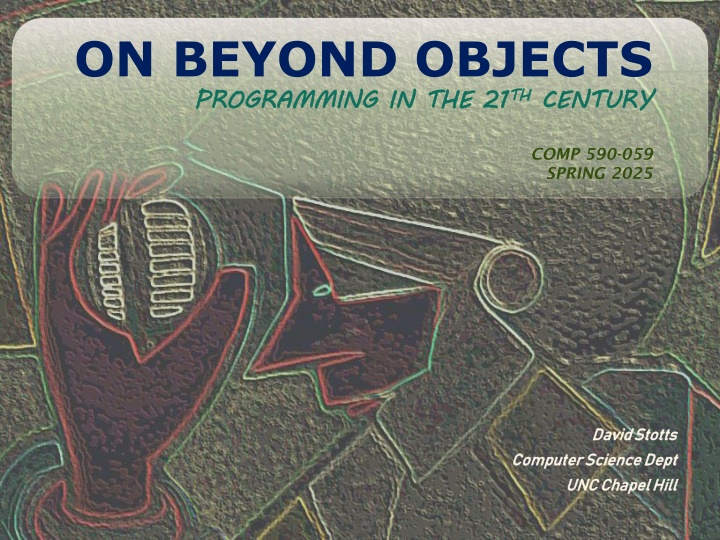
Rust - Modern Systems Programming Language Overview
"Explore Rust, the modern systems programming language known for safety, speed, and concurrency. Discover its history, goals, and key features for building reliable software in the 21st century."
Download Presentation

Please find below an Image/Link to download the presentation.
The content on the website is provided AS IS for your information and personal use only. It may not be sold, licensed, or shared on other websites without obtaining consent from the author. If you encounter any issues during the download, it is possible that the publisher has removed the file from their server.
You are allowed to download the files provided on this website for personal or commercial use, subject to the condition that they are used lawfully. All files are the property of their respective owners.
The content on the website is provided AS IS for your information and personal use only. It may not be sold, licensed, or shared on other websites without obtaining consent from the author.
E N D
Presentation Transcript
ON BEYOND OBJECTS PROGRAMMING IN THE 21 PROGRAMMING IN THE 21TH THCENTURY CENTURY COMP 590-059 SPRING 2025 David Stotts David Stotts Computer Science Computer Science Dept UNC Chapel Hill UNC Chapel Hill Dept
RUST THE BASICS THE BASICS
Overview Rust Modern systems programming language Focuses on safety, speed, and concurrency Gaining popularity for its innovative features and robust performance Ideal for high-performance applications A viable alternative to C/C++ with enhanced safety features Growing community and ecosystem
Useful Links Rust Rust Playground https://play.rust-lang.org Java Playground https://leetcode.com/playground/new/empty Original GH presentation (2010) Rust is mostly safety (GH) Fearless concurrency (A. Turon) Install Rust Rust Doc: The Rust PL Book Rust Doc: Rust by Example
A Bit of History Rust Developed by Graydon Hoare in 2006 (was Mozilla employee) Initial personal project, later sponsored by Mozilla Research ( 2009 ) Officially announced by Mozilla in 2010 ( very incomplete ) First stable release ( Rust 1.0 ) in May 2015 N am e "R ust" w as chosen as hom age to the rust fungus being robust and w idely distributed the rust fungus has tenacity and adaptability it has robustness and resilience like program s w ritten in R ust PL resist com m on program m ing issues like m em ory corruption
Goals of Rust Rust Create a PL assisting everyone to build reliable and efficient software Lessen common pitfalls in C and C++, esp. regarding memory safety Eliminate common bugs ( e.g., null pointers, buffer overflows ) Provide rich features for concurrent programming without data races Use cases -- systems programming, web servers, game development -- embedded systems, command-line tools and filters (grep) -- blockchain and crypto, network protocols, distributed systems -- Big Data tools, high performance libraries -- scientific code, simulations, numerical libraries
Our Goals Rust We are teaching Rust to computer science students with some experience in PLs, systems, and concurrent computation PL exposure: Python, JavaScript, C, Java, and now Erlang/Elixir, Go, bit of SML Rust is a feature-ful language with and some syntax that is less Java-ish , less familiar ( although you have survived Erlang ! ) We will dive into some of the most fundamental concepts that Rust emphasizes, beyond just syntax. We have a limited number of hours for presentations and practice, so we will prioritize concepts that highlight Rust s unique features its ownership model, memory safety, and concurrency model Try to give enough context to appreciate how Rust fits into modern systems programming.
Raison D'tre Rust Rust is mostly safety says Graydon Hoare Safety in the systems space is Rust's raison d' tre. Especially safe concurrency ( or as Aaron [Turon] put it, fearless concurrency ) (GH) Original GH presentation (2010)
Is Rust Hard to Learn ? Rust It can be a challenge, even for people familiar with traditional PLs like Java, Python, etc. due to it s unique features and emphasis on memory safety with no garbage collector Ownership, borrowing, lifetimes Strong distinction between mutable and immutable values, rules control where references to values can and cannot be made Memory Management No garbage collector, so memory is managed manually, through borrowing rules and scoping Strict Compiler Rust s compiler is infamously strict, from enforcing rules around memory safety and concurrency, but it provides detailed helpful error messages. New learners encounter multiple compiler errors and warnings as they adapt to Rust s requirements. Experienced programmers do too. Error Handling A bit different from better-known exception handling, requires more boilerplate code but encourages more robust and predictable code Concurrency and Safe Multi-threading ownership / borrowing rules must apply across threads, but get freedom from race conditions
How to Make it Easier Rust Start with basics Read and try the first few chapters of the The Rust Programming Language Rust is considered to have excellent documentation Practice a lot Try writing code and in this way figure out all the mut, immut, ownership and borrowing stuff. The compiler gives detailed and helpful error messages, and often suggests code to try when something you wrote wont work. Try Rust Playground You can write and run Rust code in your browser, allows you to try different things quickly https://play.rust-lang.org Tools: Playground includes tools like rustfmt for formatting and clippy for linting, which help you write idiomatic and efficient Rust code. Code Sharing: Each Playground session generates a unique URL that you can share, making it easy to collaborate, ask for help, or demonstrate examples to others in the Rust community. Add Dependencies: For simple projects, you can add dependencies from crates.io (the Rust package registry)
To Do Rust Read the Rust book (online) first few chapters Try the guessing game program there Try the programs in these slides Take some simple Java programs you have laying around and try to convert that to Rust to get used to mut, immut, refs, etc Try a few Rust programs in the functional paradigm style
Technical Structure Rust Compiles directly to machine code ( like Go ) Rust does not require a virtual machine ( as does Java, Erlang/Elixir ) Rust is not WORA in the traditional sense But, Rust has good cross-compilation abilities ( e.g., if you are on a Linux box you can compile your Rust code into Windows binaries ) These capabilities are inherent to the basic Rust system and is primarily managed through Rust's own tools, such as rustup, cargo, and the Rust compiler ( rustc ) it does not require a third-party IDE to get them IDEs of course can make integration and application of the Rust tools easier
LLVM Use for Cross-Platform Rust LLVM is Low Level Virtual Machine It is used by the Rust compiler (not a VM at runtime) to make good cross-platform code generation possible with high quality levels 1) Intermediate Representation (IR) Rust code is first compiled to an intermediate representation (IR) that LLVM understands. This IR is a platform-independent code format that allows LLVM to apply various optimizations. 2) Optimization Passes LLVM applies multiple optimization passes to improve performance and reduce the size of the code. These optimizations help Rust produce efficient binaries that rival those produced by C and C++. 3) Machine Code Generation After optimization, LLVM generates machine code for the target architecture (e.g., x86, ARM) This step ensures that Rust code can be compiled into native executables for various platforms.
Language features of note Rust Like Go unlike Java and C++ Rust does not have classes or inheritance Rust has Structs and Traits structs define data structures traits define shared behavior, similar to interfaces in Go emphasizes data and behavior separations Polymorphism comes from trait implementations, and generics
Lets Run Some Code Rust Install Rust Download zip code Compiler is rustc Command line shell mkdir rustCode cd rustCode mkdir exOne cd exOne vim main.rs rustc main.rs ./main.exe use std::io; fn main() { println!("Enter a number:"); // Read user input let mut input = String::new(); io::stdin().read_line(&mut input).expect("Read failed"); // Parse input to integer, handling possible errors let number: Result<i32, _> = input.trim().parse(); match number { Ok(n) => { // Demonstrate ownership and borrowing let squared = square(n); println!("Square of {} is {}", n, squared); } Err(_) => { eprintln!("Enter a valid number."); } } } fn square(num: i32) -> i32 { num * num }
Lets Run Some Code Rust use std::io; fn main() { println!("Enter a number:"); // read user input let mut input = String::new(); io::stdin().read_line(&mut input).expect("Read failed"); // parse input to integer, handling possible errors let number: Result<i32, _> = input.trim().parse(); match number { Ok(n) => { // Demonstrate ownership and borrowing let squared = square(n); println!("Square of {} is {}", n, squared); } Err(_) => { eprintln!("Enter a valid number."); } } } fn square(num: i32) -> i32 { num * num }
Variable Declarations Rust Keyword let is used to declare most (but not all) variables A variable is immutable by default, but may be made mutable with keyword mut let x = 5; // `x` is an immutable var, default behavior let mut y = 10; // `y` is mutable, can be changed later The default is "immutable" which encourages you to only use mutable vars if you really need to. This cuts down on accidental changes to var values, improves clarity and safety of code Let s look at default (immutable) vars first fn main() { let x = 5; // immut by default let x = x + 1; // shadows earlier x with new immut x { let x = x * 2; // a 3rd immut x, shadows the 2nd println!("The value of x in the inner scope is: {x}"); } println!("The value of x is: {x}"); }
Variable Declarations Rust This is NOT one storage location called x that keeps getting new values It is 3 separate storage locations fn main() { let x = 5; // immut by default let x = x + 1; // shadows earlier x with new immut x // ^ 1st x gives the value to increment // ^ then creates a new 2nd x, to shadow the 1st { let x = x * 2; // ^ uses the 2nd x for value // ^ then creats a new (3rd) x to shadow the second println!("The value of x in the inner scope is: {x}"); } // end of scope, 3rd x no longer exists println!("The value of x is: {x}"); // ^ this value comes from 2nd x }
Variable Declarations Rust This is NOT one storage location called x that keeps getting new values It is 3 separate storage locations All 3 storage locs exist here 2 are shadowed, this 1 is visible fn main() { let x = 5; // immut by default let x = x + 1; // shadows earlier x with new immut x // ^ 1st x gives the value to increment // ^ then creates a new 2nd x, to shadow the 1st { let x = x * 2; // ^ uses the 2nd x for value // ^ then creats a new (3rd) x to shadow the second println!("The value of x in the inner scope is: {x}"); } // end of scope, 3rd x no longer exists println!("The value of x is: {x}"); // ^ this value comes from 2nd x } Inner is dropped (destroyed) here Both earlier exist, this 1 is visible Both earlier are destroyed here Drop automatically as their scope ends
Variable Declarations Rust There are three separate storage locations created with name x in this code: the 1st x is initialized to 5 in the outermost scope. the 2nd x, shadowing the 1st, is created with the value 6. the 3rd x, shadowing the 2nd, is created in the inner scope with the value 12. Each shadowed x is independent and has its own memory location. Once a scope ends, the shadowing x in that scope is no longer accessible, and any memory it used may be freed or reused by Rust. This approach helps maintain immutability within each scope while allowing flexibility with variable naming and usage. Immutability is a property of a storage location, not a name (a symbol)
Variable Declarations Rust Each let binding represents a separate, independent storage location. When you declare let x = 5; you add to your program s memory a new, immutable storage location you put the value 5 into that memory location you bind the name x to that location you set the rule that no value other than 5 can ever be in that memory location Shadowing creates a new storage location, but lets you use the same name (symbol) to designate the memory address. This is convenience you do not have to invent a different symbol for every location this may help in the readability and clarity of your algorithm Shadowing means you never have a single name ( like x) denoting two different memory addresses in any one scope So if x is shadowed multiple times, each new x is immutable in its own right, even though each one has the same name. The immutability property is associated with the storage location behind each x, not the symbol x itself.
Variable Declarations Rust To emphasize this subtle distinction let foo = go heels!!"; // declares immut var of type string slice println!( foo: {} , foo); let foo = foo.len(); // declares immut var of int type usize println!( foo: {} , foo); let foo = 3.14.15926; // declares immut var of float type f64 Three let statements means 3 separate memory locations created Shadowing makes it appear the type of foo changes, but really there are 3 different foo bindings and only one is visible/useable at a time We just don t have to create 3 different symbol names for the 3 locations
Basic Rust Rust You can get major mileage just using -- all default immutable vars -- all functions return values fn add(a: i32, b: i32) -> i32 { a + b // returns the result of a + b } fn main() { let x = 5; // immutable variable let y = 10; // immutable variable let result = add(x, y); // returns a value from a function println!("The sum of {} and {} is: {}", x, y, result); } Functional paradigm Rust is a multi-paradigm PL
Example Rust Rust Playground https://play.rust-lang.org Java Playground https://codapi.org/java/
Example Rust Rust Playground https://play.rust-lang.org fn main() { let s = String::from("hello"); let r1 = &s; let r2 = &s; println!("{} and {}",r1,r2); let r3 = &mut s; println!("{}",r3); }
Comparison: Java Code Rust Java playground: https://leetcode.com/playground/new/empty public class Main { public static void main(String[] args) { Integer num = 10; StringBuilder text = new StringBuilder("Hello"); modVals(num, text); System.out.println("num after modVals: " + num); // Still 10 System.out.println("text after modVals: " + text); // Modified } public static void modVals(Integer number, StringBuilder str) { number = 20; // No effect outside this method // due to Integer immutability str.append(" World"); // Modifies original StringBuilder } }
Comparison: Rust Code Rust fn main() { let num = 10; let mut text = String::from("Hello"); modify_values(num, &mut text); println!("num after modify_values: {}", num); // Still 10 println!("text after modify_values: {}", text); // Modified } fn modify_values(number: i32, str: &mut String) { // Trying to change `number` here would do nothing // outside this fn because `i32` is a Copy type, and // we passed a copy of `number`. let _new_number = 20; // Modifies the original `text` by borrowing it mutably str.push_str(" World"); }
What are Lifetimes ? Rust Lifetime -- a core concept that simply means the scope in a program text in which a reference is valid. Rust uses lifetimes to enforce that references don t hang around when the data they point to are gone have passed out of scope This prevents dangling references Different in principle to Java, where dangling refs are de facto and then swept up by the garbage collector ( in Go too ) So a reference has a lifetime, implicitly assigned by the compiler In most cases, the compiler can automatically infer lifetimes Sometimes we need manual lifetime annotations to assist
Lifetime Example Rust fn main() { let s1 = String::from("hello"); let r1 = &s1; // r1 borrows s1 immutably println!("{}", r1); // r1 is still valid here // s1 is dropped here at the end of its scope, // and r1 is no longer valid after this point } So we have an issue if we were to pass a reference like r1 (a reference to s1) out to some other scope that might live beyond fn main execution Like if we fired up a thread and sent r1 to it The borrow checker in the compiler traces these possible execution paths to make sure all the references are valid (or will be at run time) and have actual data still in the memory locations they point to
Another Lifetime Example Rust A function that returns a reference to data fn longest<'a>(s1: &'a str, s2: &'a str) -> &'a str { if s1.len() > s2.len() { s1 } else { s2 } } fn main() { let str1 = String::from("hello"); let str2 = String::from("world"); let result = longest(&str1, &str2); // `result` is a reference that must live // as long as `str1` and `str2` println!("The longest string is {}", result); } So we have an issue if we were to pass a reference like r1 (a reference to s1) out to some other scope that might live beyond fn main execution Like if we fired up a thread and sent r1 to it The borrow checker in the compiler traces these possible execution paths to make sure all the references are valid (or will be at run time) and have actual data still in the memory locations they point to
What is Ownership ? Rust Ownership -- a core concept that defines how memory is managed and accessed within a program. Each piece of data has a single owner The owner is responsible for the lifecycle of the data, including its allocation and deallocation in memory Ownership rules ensure memory safety and prevent issues such as memory leaks and data races. Ownership rule give memory safety guarantees without a garbage collector In Rust, borrowing refers to the practice of allowing one part of the program to temporarily access data owned by another part of the program without taking ownership of it.
Owner Responsibility Rust When ownership is transferred, the original owner gives up control over the value, and the new owner becomes responsible for it. It means to ensure that when the scope the owner is in (a code block, a function body, a concurrent process, etc.) is exited (or ends) several important aspects related to memory mgmt and resource cleanup happen, or are accounted for Failure to bracket properly causes m em ory leaks The traditional issue that comes to mind related to being responsible for values is the C issue of malloc / free When code calls malloc( ) to get a pointer to a fresh memory chunk in the heap ( object in newer parlance ) then the code now has an obligation to return that memory chunk by calling free( ) when the code is done using it
Ownership Transfer Rust Ownership transfer refers to the process of moving the ownership of a value from one variable to another (and hence a possible change of scope for that value s existence) The transfer concept is central to Rust's memory management model and ensures that each piece of data has a single owner at any given time This helps prevent issues like double freeing of memory, not freeing memory, and data races ( two owners, or two mut references ) When ownership is transferred, the original owner gives up control over the value, and the new owner becomes responsible for it.
Ownership Transfer Example Rust // version 1 fn main() { let s = String::from("hello"); // `s` is original owner of the String println!("s: {}", s); let s2 = s; // Ownership of `s` is transferred to `s2` println!("s: {}", s); // Err: `s` no longer owns the data } // version 2 fn main() { let s = String::from("hello"); // `s` is original owner of the String println!("s: {}", s); println!("Stack address of s: {:p}", &s); // Stack address of `s` println!("Heap data address of s: {:p}", s.as_ptr()); // Heap add of string data let s2 = s; // Ownership of `s` is transferred to `s2` println!("s2: {}", s2); println!("Stack address of s2: {:p}", &s2); // Stack address of `s2` println!("Heap data address of s2: {:p}", s2.as_ptr()); // Heap add of string data // (should match `s`'s) // Uncommenting the next line would cause an error because `s` // no longer owns the data. // println!("s: {}", s);}
Ownership Transfer Example Rust // version 3 fn main() { let s = String::from("hello"); // `s` is original owner of the String println!("s: {}", s); println!("add s:{:p}", &s); let s2 = s; // Ownership of `s` is transferred to `s2` //println!("s2: {}", s2); //println!("add s2:{:p}", &s2); //let s2 = s.clone(); // copy here, not ownership xfer //println!("s: {}", s); // Err: `s` no longer owns the data } // version 4 fn main() { let mut s = String::from("hello"); // `s` is original String owner println!("s: {}", s); println!("add s:{:p}", &s); let s2 = s; // println!("s: {}", s); // legal? println!("s2: {}", s2); println!("add s2:{:p}", &s2); s = s2; // legal? println!("s: {}", s); println!("add s:{:p}", &s); // println!("s2: {}", s2); // println!("add s2:{:p}", &s2); }
Move vs. Copy Semantics Rust Two forms of "assignment" we just saw The terms "move semantics" and "copy semantics" refer to how ownership and memory are managed when variables are assigned, passed to functions, or returned from functions. Move and Copy apply to values, and how they relate to variables bound to them
Move vs. Copy Semantics Rust Two forms of "assignment" we just saw The terms "move semantics" and "copy semantics" refer to how ownership and memory are managed when variables are assigned, passed to functions, or returned from functions. After a move, the original variable (original owner) cannot be used, as it does not own a value. See code version 1 Essentially the original binding is done gone; the value is now bound to a different variable a different storage location Original storage can be eliminated (reclaimed) New storage (variable) now has responsibility of ownership Move semantics is the default for most Rust types, especially ones that manage resources (like heap allocated storage, sockets, etc.) Move semantics are used for efficiency no need to copy large amounts of data, since move can be done with one pointer assignment Move semantics When a value is moved, its ownership is transferred from one var to another Move and Copy apply to values, and how they relate to variables bound to them
types that implement the Copy trait have copy semantics Move vs. Copy Semantics Rust Copy semantics Happens when a value is duplicated as it is assigned, passed, or returned New value created is a bitwise copy of the original, so the 2 copies are completely independent or each other Types that implement the copy trait have copy semantics for their values by default most simple types like ints, floats, bools, chars, fixed arrays, tuples, structs where the fields or elements implement copy, etc. not more complex structures, like String, Vector, Box, slice, etc. The original variable is available with the new one after the assignment after the copy See code version 2
What is Borrowing ? Rust In Rust, borrowing refers to the practice of allowing one part of the program to temporarily access data owned by another part of the program without taking ownership of it. Borrowing allows for efficient memory usage by enabling multiple parts of the program to work with data without having to duplicate it. Rust enforces strict rules around borrowing to ensure memory safety and prevent data races. Using Borrowing, Ownership, and Lifetimes Rust prevents common memory errors like null pointers and null dereferencing, data races, memory leaks (all without a garbage collector)
Borrowing Rules Rust At any point in execution of a program, you can have either: One mutable reference to a value ( like &mut val ) Any number of immutable references to a value ( like &val ) But not both at the same time (in the same scope) Ownership: When you move a value into another variable, the original variable can no longer access it ( the value has moved )
Borrowing Rust Two types of borrowing in Rust Immutable borrow When you borrow data immutably, you get a read-only reference to the data. Multiple parts of the program can hold immutable references to the same data at the same time, but none of them can modify it. Mutable borrow When you borrow data mutably, you get a reference that allows you to modify the data. However, Rust ensures that only one mutable reference to the data can exist at any time, preventing potential conflicts in modifying the data simultaneously
Borrowing Rust Rust enforces borrowing rules at compile time so that: o Data is either owned by one part of the program or borrowed temporarily, but never both at the same time. o Immutable references can coexist, but mutable references are exclusive to prevent data corruption. o Once the borrow is done, the ownership or references are properly cleaned up to avoid dangling pointers or memory leaks. In essence, borrowing allows safe, efficient access to data without transferring ownership, and Rust's borrowing system ensures that this is done in a memory-safe way.
References Rust We can create references (pointers) in Rust, similar to C fn main() { let foo = 27; // declares immut var of type i32 println!("foo: {}", foo); let bar = &foo; // declares immut reference to foo, type &i32 println!("bar (ref): {:p}", bar); println!("bar val: {}", *bar); } References (like vars) can be mutable (default) or immutable fn main() { let mut x = 5; // Immutable borrow: We can have multiple immutable borrows let y = &x; // Immutable borrow of x let z = &x; // Another immutable borrow of x // Mutable borrow: We can't borrow x mutably while it s // already immutably borrowed // let w = &mut x; // Error: cannot borrow `x` as mutable // because it is also borrowed as immutable println!("y: {}, z: {}", y, z); // println!("w: {}", w); }
&mut x) to x. Once you borrow xmutably, Rust doesnt allow any other references (even immutable ones) to access x until the mutable reference is no longer used. w w is a mutable reference (&mut x References Rust Try a variant fn main() { let mut x = 5; println!("x (pre): {}",x); // Immutable borrow: We can have multiple immutable borrows // let y = &x; // Immutable borrow of x // let z = &x; // Another immutable borrow of x // Mutable borrow: We can't borrow x mutably while it s // already immutably borrowed let w = &mut x; // Error: cannot borrow `x` as mutable // because it is also borrowed as immutable *w = 7; // println!("y: {}, z: {}", y, z); println!("w: {}",w); println!("x (post): {}",x); // println!("w: {}, x: {}" , w, x) // try uncommenting } w is a mutable reference ( &mut x ) to x . once you borrow x mutably, Rust doesn t allow any other references (even immutable ones) to access x until the mutable reference is no longer used x cannot be accessed while it's mutably borrowed by w because Rust s borrow checker ensures that you cannot have both mutable and immutable references to the same value at the same time. In this case, the mutable reference w prevents you from accessing x directly.
Borrowing Rust ( using int vars only ) fn main() { // Creating an owned integer variable let x = 10; // x is an i32, owned by main // Immutable borrowing let y = &x; // y is an immutable reference to x println!("The value of x is: {}", y); // Prints 10 // Trying to modify through an immutable reference // (uncommenting the next line would cause an error) // *y += 1; // This would cause a compilation error // because y is an immutable reference // Mutable borrowing let mut z = 20; // z is a mutable i32 { let w = &mut z; // w is a mutable reference to z *w += 5; // Modify z through w } // w goes out of scope here, so z can be borrowed again println!("The new value of z is: {}", z); // Prints 25 // Borrowing x again (immutable reference) let a = &x; // a is an immutable reference to x println!( value of x after z is modified: {}", a); // Prints 10 // Final note on ownership let b = x; // Ownership of x is moved to b // println!("The value of x is: {}", x); // This would cause a compilation // error because x is no longer valid println!("The value of b is: {}", b); // Prints 10 }
Topics Rust Memory safety model ( MSM ) Memory safety guarantees ( MSG ) The lifetimes system -- lifetime elision -- automatic lifetime inference The ownership system ( allows/provides MSG ) Borrowing Move semantics vs Copy semantics Borrow checker Let and mut and var binding Shadowing
END END
Processes( from erlang.org ) P rocesses are created w ith the spaw n function, w hich takes a function as an argum ent and returns a process identifier (pid). A n E rlang program is a call to an initial function (in a m odule); that function m ay spaw n other processes w hich m ay spaw n m ore, etc. E rlang processes operate in (m em ory) isolation from each other, and are scheduled by E rlang's Virtual M achine (VM ). The creation tim e of process is very low , the m em ory footprint of a just spaw ned process is very sm all, and a single E rlang VM can have m illions of processes running. The default m ax num ber of alive processes is by default 32,768. This lim it can be raised up to 268,435,456 processes at startup.








